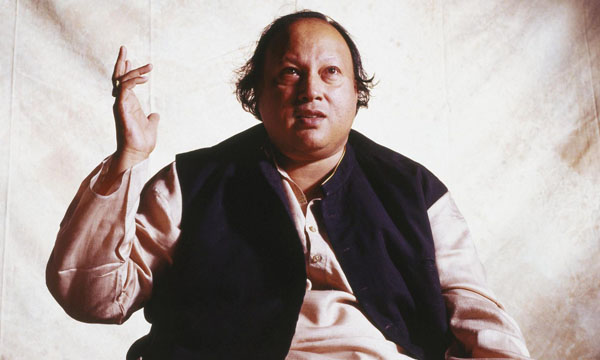

Other popular records include Akhiyan Udeek Diyan, Yaar Na Wichray, Mera Piya Ghar Aya and Meri Zindagi.

His massive hit Dam Mast Qalandar became household anthems. The music maestro released as many as 25 Qawwali albums which earned him several awards and honours.

He received a number of national and international honorary awards in his glorious career. Two years before his death, he was honored with the prestigious UNESCO Music Prize. In 1987, the government of Pakistan bestowed Pride of Performance on the legendary singer for his contribution to Pakistani music. Q: You were taught the Qawwali form by your uncle.The legendary singer, who contributed to Pakistani music and enthralled the audience of both sid, as he was equally popular in Indo-Pak subcontinent and across the world. And when they listen, then I will sing whatever I wish, whatever’s right, to the audience, and they will listen to it.” Because this way, then people will listen to my music. So for me, it’s necessary to give importance to Bollywood. And let me tell you that people are listening to Bollywood a lot. It’s a great song, very soulful tune, very Bollywood. People have liked it quite quickly and its had millions of hits just within days.
#NUSRAT FATEH ALI KHAN BEST QAWWALI LIST MOVIE#
And then there’s “Jag Ghoomeya” (a song from the movie “Sultan”), which has just been released. But in the Indian film industry, from the moment a child is born, he is taught music, he is taken for classical classes.”Ī: “My upcoming projects are quite different, in which there is also international collaboration. People didn’t even want their children to learn. Before that, the circumstances were really bad. It’s only in the last 10 years that people in the industry have taken it into their hearts, or started to think about it. Q: What’s the main difference between working in the Pakistani and Indian film industries?Ī: “The difference in working in Pakistan is that in the past 40 years, Pakistan’s music has not been accepted by the masses. I will say that the pride within them, the frustration, the power, it is this which takes them forward.” (But) Pakistani artists are still recognised. Q: What is the future of the music industry in Pakistan?Ī: “In Pakistan, there’s the unfortunate situation that there is no music label there to promote music like there used to be. After him, the next person I liked was Whitney (Houston). Q: If there was anyone in the world you could collaborate with on a song, who would it be?Ī: “He is no longer in this world. It gives birth to spirituality and brings peace to life that everyone would have experienced, whoever is a Qawwali listener, they would see how calm they are.” Its reputation, its respect, they’ve increased this for the listeners. Q: What is it like to be part of an acclaimed musical family?Ī: “I think that our family is very fortunate, very lucky, that on their own merit, from themselves, using whatever means necessary, singing Qawwali, in all corners and areas, in every place, singing in villages, they’ve promoted it. We’ll perform all three segments over more than three hours.” And the third segment, which is the most important (one) that they miss, is Qawwali. The other segment we’ll perform is what they miss, and that’s the ‘unplugged’ version. The first one is the music they’ve been listening to for many years.

Q: What can people expect from your concerts in London, Manchester and Coventry?Ī: “We’ll be performing three segments for viewers and listeners. In one of his first interviews with international media, Khan spoke about the challenges faced by the Pakistani music industry and his efforts to promote the musical legacy of his uncle, Nusrat Fateh Ali Khan, a Qawwali master who died in 1997. Khan, who performed at last year’s Nobel Peace Prize awards, said his brief British tour would include classical music from Pakistan as well as popular songs from Indian movies, including the recent film “Sultan”. Queen Latifah (L) looks on as Ustad Rahat Fateh Ali Khan performs at the Nobel Peace Prize Concert in Oslo December 11, 2014.


 0 kommentar(er)
0 kommentar(er)
